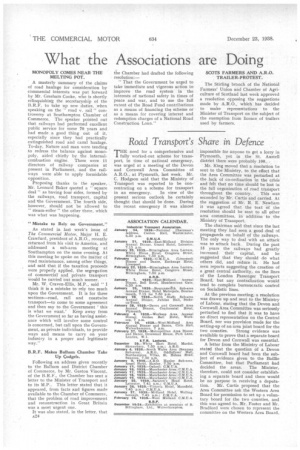What the Associations
Page 26

If you've noticed an error in this article please click here to report it so we can fix it.
are Doing
MONOPOLY COMES NEAR THE MELTING POT.
A masterly summary of the claims of road haulage for consideration by commercial interests was put forward by Mr. Gresham Cooke, who is shortly relinquishing the secretaryship of the B.R.F. to take up new duties, when speaking on the " road v. rail " controversy at Southampton Chamber of Commerce. The speaker pointed out that railways had performed excellent public service for some 70 years and had made a good thing out of it, especially since they had practically extinguished road and canal haulage. To-day. Nature and man were tending to redress the balance against Monopoly, aided chiefly by the internalcombustion engine. There were 11 directors of railway companies at present in Parliament, and the railways were able to apply formidable opposition.
Proposing thanks to the speaker, Mr. Leonard Baker quoted a "square deal " as having four sides, formed by the railways, road transport, capital and the Government. The fourth side, however, should not be allowed to " steam-roller " the other three, which was what was happening.
"Mistake to Rely on Government."
As stated in last week's issue of The Commercial Motor. Major H. E. Crawfurd, president of A.R.O., recently returned from his visit to America, and addressed a sub-area meeting at Southampton on the same evening. At this meeting he spoke on the matter cf road maintenance, among other things, and said that if the taxation proceeds were properly applied, the segregation of commercial and private transport Would be carried out much sooner.
Mr. W. Craven-Ellis, M.P., said " I think it is a mistake to rely too much upon the Government. It is for three sections—road, rail and coastwise transport—to come to some agreement and then say to the Government ' this is what we want.' Keep away from the Government so far as having assistance which will involve some control is concerned, but call upon the Government, as private individuals, to provide ways and means to carry on your industry in a proper and legitimate way."
B.R.F. Makes Balham Chamber Take Up Cudgels.
Following an address given recently to the Balham and District Chamber of Commerce, by Mr. Gaston Vincent, of the B.R.F., the Chamber has sent a letter to the Minister of Transport and to its M.P.. This letter stated that it appeared, from facts and figures made available to the Chamber of Commerce, that the problem of road improvement and reconstruction in Great Britain was a most urgent one.
It was also stated, in the letter, that a24 the Chamber had drafted the following resolution:— " That the Government be urged to take immediate and vigorous action to improve the road system in the interests of national safety in times of peace and war, and to use the full extent of the Road Fund contributions as a means of financing the scheme or as a means for covering interest and redemption charges of a National Road Construction Loan." SCOTS FARMERS AND A.R.O. TRAILER-PROTEST.
The Stirling branch of the National Farmers' Union and Chamber of Agriculture of Scotland last week approved a resolution opposing the suggestions made by A.R.O., which has decided to make representations to the Minister of Transport on the subject of the exemption from licence of trailers used by farmers.




































































